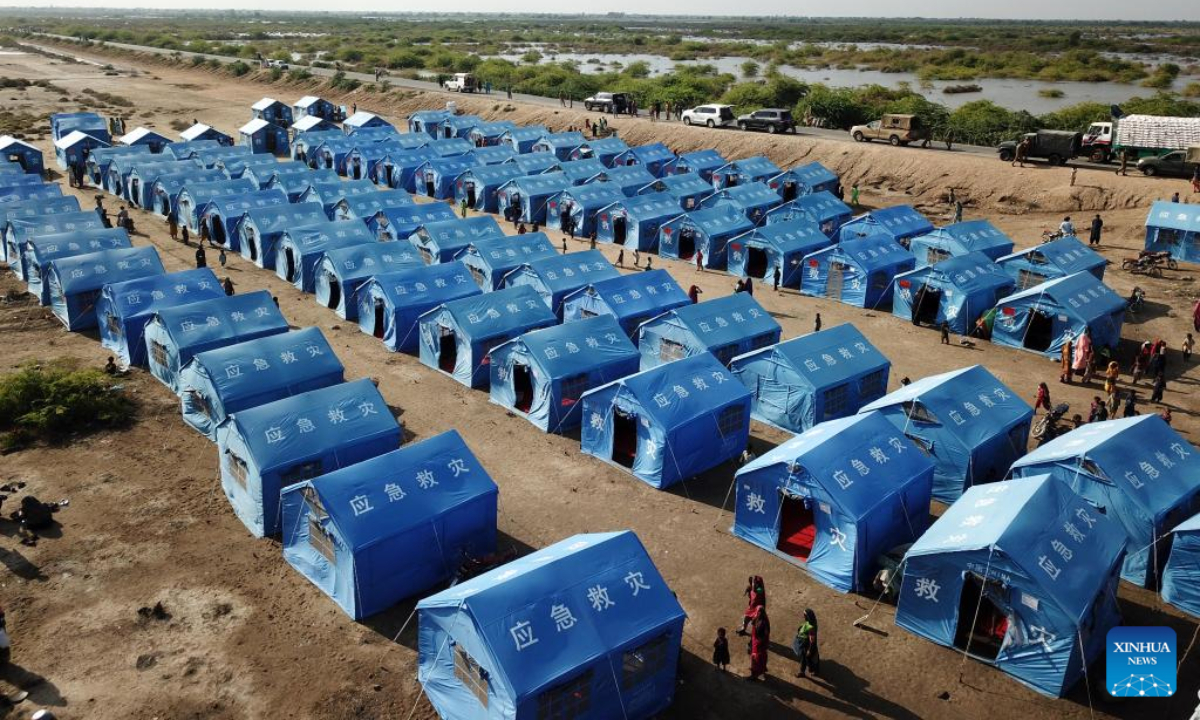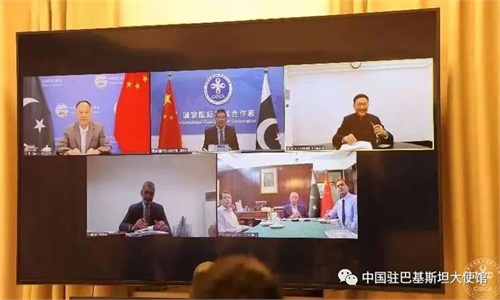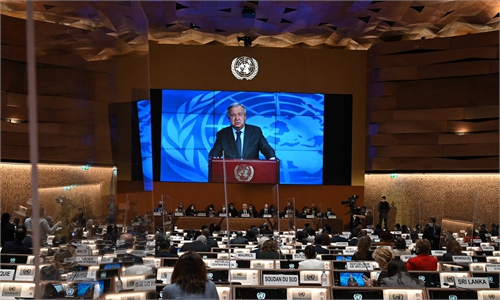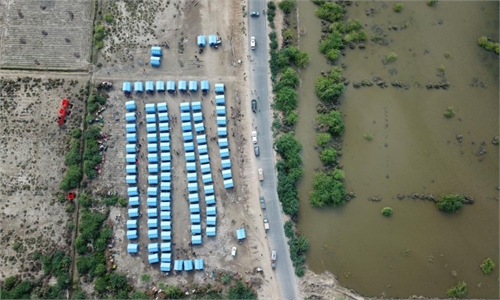Chinese firms put deeper roots in Pakistan in post-flood reconstruction; more joint efforts needed for regional recovery: experts

Aerial photo taken on Sep 29, 2022 shows a makeshift shelter built with tents donated by China in flood relief aid in Matli town of Badin District in southern Pakistan's Sindh province. Photo:Xinhua
Chinese infrastructure companies in Pakistan are playing an increasingly important role in supporting the regional economy and livelihoods as the country looks for more joint efforts from the international community to facilitate the gradual recovery from the lingering devastation of recent floods.
While Chinese companies have taken an active approach in providing constant aid, they have also beefed up efforts to maintain the smooth operation of their projects in some key areas such as power generation and housing in Pakistan, as the country, hit by unprecedented floods in September, has seen its economic recovery slowing down.
Industry insiders and experts said that more joint efforts, including safety guarantees for local personnel and projects of Chinese companies, are needed more than ever to ensure the smooth operation of these projects.
Good news came from the Karot Hydropower Project located in Punjab province. The project, invested and constructed by China Three Gorges Corporation, has now been operating safely and stably for over 100 days, with a cumulative power generation of more than 1.537 billion kilowatt-hours, the infrastructure company said in a statement sent to the Global Times on Saturday.
Heavy rainfall since June resulted in unprecedented disaster, with roads cut and power supplies disrupted in some regions. China Three Gorges Corporation has worked in full swing to ensure the safety of the project operation while providing donations to facilitate the country's reconstruction following the floods, according to the company.
But the situation in Pakistan lingers and challenges remain for regional recovery. "While the rains have ceased and the water is beginning to recede, many areas in the south remain inundated and, with winter approaching, the situation is going from bad to worse," according to the United Nations on Friday.
More than 15 million people could be pushed into poverty, and the effects of the floods will be felt not just for days or months but will linger in Pakistan for years to come, said the UN.
In the wake of the recent devastating floods, the UN General Assembly adopted a resolution on Friday, urging the international community to provide full support and assistance to the Pakistani government in its efforts to mitigate the negative impacts of the floods and meet the medium- and long-term rehabilitation and reconstruction needs.
Responding to the devastation of its neighboring country and close partner, the Chinese government and companies have taken an active approach since the beginning with all kinds of support already in place and more to follow.
Power Construction Corporation of China (PowerChina) has taken an active approach to help those in need. Two rounds of financial donations, totaling 18.20 million Pakistani Rupees ($80,717.49), have been provided, according to the statement that PowerChina sent to the Global Times on Saturday.
PowerChina is going to provide an additional $100,000 in donations to the Prime Minister's Flood Relief Fund, the Global Times learned.
In addition to this financial aid, Chinese companies with projects based in the country have ramped up efforts to ensure the smooth operation of these projects, a major pillar for regional economic recovery, as the country looks to post-flood reconstruction.
For example, the Diamer-Bhasha Dam project, Pakistan's "Three Gorges Dam," undertaken by PowerChina was affected by secondary disasters such as landslides, with construction and logistics materials unable to be delivered to the site for a long period of time.
Despite the difficulties, a rescue team with large mechanical equipment was dispatched to help with the rescue work in the region, including repairing damaged roads and canals for local villages.
After the restoration of traffic on the main roads, PowerChina immediately organized the resumption of work and production of the Diamer-Bhasha Dam project and re-compiled the construction plan for the month.
Materials soon entered the site, and the normal construction of the project has fully resumed since mid-September.
At the Dasu hydropower project, which is contracted with China's Gezhouba Group Co, construction work has returned to its normal state after the teams dealt with landslides in August, the company told the Global Times on Saturday.
The project team also helped with local efforts in restoring a damaged bridge along the Karakoram Highway.
China's Henan D.R. Construction Group, a large construction company with several projects in Pakistan, invested $150 million in Faisalabad Industrial Estate, the Faisalabad Free-Zone M3IC in Pakistan a few years ago. It has now moved to an emergency status focusing on helping the victims of the flood by providing them with low-cost houses, a manager with the company told the Global Times.
Henan D.R. Construction Group can prepare 200 houses each month and more than 2,000 in a year to help those in need, the company said.
Other companies including China State Construction Engineering Corporation also donated goods with a total value of 10 million Pakistani Rupees on Friday.
In a recent meeting between the Chinese Ambassador to Pakistan Nong Rong and Pakistani Minister of State for Foreign Affairs Hina Rabbani Khar on Wednesday, Nong told Khar about the support provided by the Chinese government and all sectors of society to Pakistan in fighting the flood while expressing that the Chinese side will continue to support Pakistan's post-disaster reconstruction.
Chinese companies have done a good job in corporate social responsibilities in Pakistan, and the recent cases for providing local aid are one of many examples of that, experts said.
"As a clean energy project, the Karot Hydropower Project is a key local development project in Pakistan, while the safe operation of these projects is the pre-condition for Pakistan to have smooth electricity supply in coping with the energy crisis," Liu Zongyi, secretary-general of the Research Center for China-South Asia Cooperation at the Shanghai Institutes for International Studies, told the Global Times.
At the same time, as a water conservancy hub, the flood storage function of the hydropower station plays an important role in alleviating floods and slowing down flood disasters in the region, Liu noted.
Experts noted that while Chinese companies are ready to play a bigger role in helping the country recover, more needs to be done from both sides, particularly in the field of security, in order to ensure the smooth resumption and reconstruction of the region as terror attacks still exist.
Liu called for more joint efforts to be put in place to provide a smooth and safer environment for the country's quicker economic recovery.
On July 14, 2021, nine Chinese nationals were killed in a shuttle bus explosion in Pakistan's Khyber Pakhtunkhwa province while the victims were on their way to the China-invested Dasu hydropower project.
The Pakistani government has made efforts to protect the construction of the China-Pakistan Economic Corridor, Chinese companies and personnel, including organizing security troops. Moreover, both sides have put a huge amount of capital and manpower into securing project safety, according to media reports.



